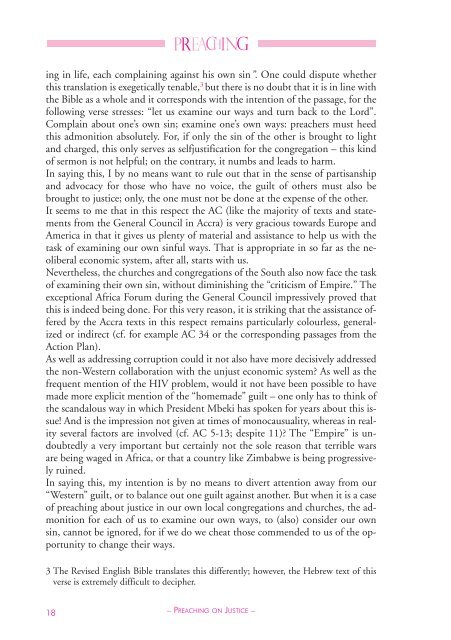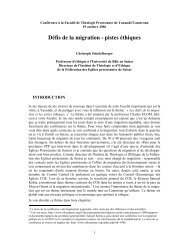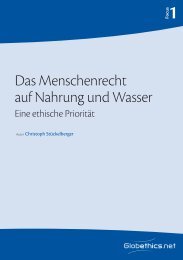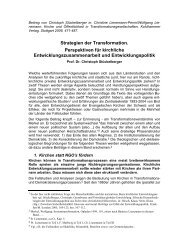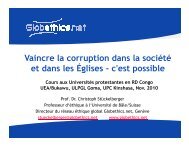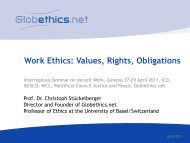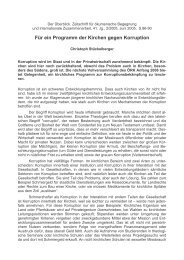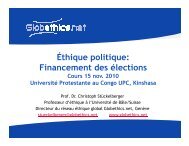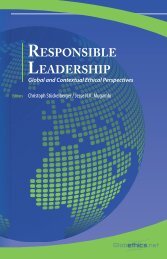BREAK THE CHAINS OF OPPRESION AND THE YOKE OF ...
BREAK THE CHAINS OF OPPRESION AND THE YOKE OF ...
BREAK THE CHAINS OF OPPRESION AND THE YOKE OF ...
Create successful ePaper yourself
Turn your PDF publications into a flip-book with our unique Google optimized e-Paper software.
PREAChing ing in life, each complaining against his own sin”. One could dispute whether<br />
this translation is exegetically tenable, 3 but there is no doubt that it is in line with<br />
the Bible as a whole and it corresponds with the intention of the passage, for the<br />
following verse stresses: “let us examine our ways and turn back to the Lord”.<br />
Complain about one’s own sin; examine one’s own ways: preachers must heed<br />
this admonition absolutely. For, if only the sin of the other is brought to light<br />
and charged, this only serves as selfjustification for the congregation – this kind<br />
of sermon is not helpful; on the contrary, it numbs and leads to harm.<br />
In saying this, I by no means want to rule out that in the sense of partisanship<br />
and advocacy for those who have no voice, the guilt of others must also be<br />
brought to justice; only, the one must not be done at the expense of the other.<br />
It seems to me that in this respect the AC (like the majority of texts and statements<br />
from the General Council in Accra) is very gracious towards Europe and<br />
America in that it gives us plenty of material and assistance to help us with the<br />
task of examining our own sinful ways. That is appropriate in so far as the neoliberal<br />
economic system, after all, starts with us.<br />
Nevertheless, the churches and congregations of the South also now face the task<br />
of examining their own sin, without diminishing the “criticism of Empire.” The<br />
exceptional Africa Forum during the General Council impressively proved that<br />
this is indeed being done. For this very reason, it is striking that the assistance offered<br />
by the Accra texts in this respect remains particularly colourless, generalized<br />
or indirect (cf. for example AC 34 or the corresponding passages from the<br />
Action Plan).<br />
As well as addressing corruption could it not also have more decisively addressed<br />
the non-Western collaboration with the unjust economic system? As well as the<br />
frequent mention �of the �HIV �problem, would �it not �have<br />
been possible to have<br />
made more explicit mention of the “homemade” guilt – one only has to think of<br />
the scandalous way in which President Mbeki has spoken for years about this issue!<br />
And is the impression not given at times of monocausuality, whereas in reality<br />
several factors are involved (cf. AC 5-13; despite 11)? The “Empire” is undoubtedly<br />
a very important but certainly not the sole reason that terrible wars<br />
are being waged in Africa, or that a country like Zimbabwe is being progressively<br />
ruined.<br />
In saying this, my intention is by no means to divert attention away from our<br />
“Western” guilt, or to balance out one guilt against another. But when it is a case<br />
of preaching about justice in our own local congregations and churches, the admonition<br />
for each of us to examine our own ways, to (also) consider our own<br />
sin, cannot be ignored, for if we do we cheat those commended to us of the opportunity<br />
to change their ways.<br />
3 The Revised English Bible translates this differently; however, the Hebrew text of this<br />
verse is extremely difficult to decipher.<br />
������������������������������������������������<br />
� � � �����������������������<br />
�<br />
�<br />
18<br />
– PREACHING ON JUSTICE –


